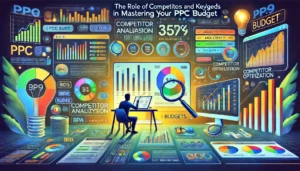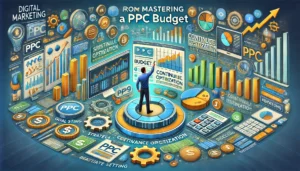Mastering Your PPC Budget: A Comprehensive Guide to Spending Wisely

Navigating the realm of pay-per-click (PPC) advertising can be daunting, especially when it comes to budgeting. The right PPC budget can make a significant difference in your campaign’s success, but determining that amount is not a one-size-fits-all process. It involves understanding your competitors, selecting the right keywords, optimizing for return on ad spend, and balancing ad types. In this article, we’ll delve into the essential steps and strategies to help you pinpoint your ideal PPC budget and spend wisely.
Mastering Your PPC Budget: Key Takeaways
- Understanding the importance of budget optimization is crucial for effective PPC campaigns.
- Defining clear PPC objectives helps align your budget with business goals.
- Finding cost-effective keywords can significantly enhance your ROI.
- Crafting compelling and relevant ads is essential for maximizing your PPC budget.
- Regular evaluation and data-driven adjustments ensure continuous improvement in PPC performance.
Understanding the Importance of PPC Budget Optimization
The Role of Competitors and Keywords when Mastering Your PPC Budget
Budget optimization is the process of allocating your PPC budget in the most efficient and effective way possible. It involves analyzing your campaign performance, identifying the best-performing keywords and ad groups, and adjusting your bids and budgets accordingly. By optimizing your budget, you can maximize your return on investment (ROI), reduce your cost per acquisition (CPA), and achieve your business goals.
Setting Realistic PPC Budget Limits
Setting clear goals and regularly optimizing your PPC campaigns will help you make the most of your budget and achieve better results. By aligning your advertising efforts with your business objectives, you can drive meaningful outcomes and maximize the return on your investment.
Adjusting PPC Budgets in Line with Revenue Growth
In this section, we will discuss the importance of budget optimization from different perspectives, such as:
- Importance in Budget
- Understanding the Importance of the Budget
- Budget Optimization
Remember, setting clear goals and regularly optimizing your PPC campaigns will help you make the most of your budget and achieve better results.
Defining Your PPC Budget Objectives
In this section, we will delve into the importance of setting clear goals when it comes to optimizing your PPC budget and spending wisely. By defining your PPC objectives, you can align your advertising efforts with your overall business goals and maximize the effectiveness of your campaigns.
Finding Cost-Effective Keywords to Fit Your PPC Budget
Researching Keyword Costs
To find cost-effective keywords, start by utilizing tools like Google Keyword Planner, SEMrush, or Ubersuggest. These tools provide insights into search volumes and competition levels, helping you identify which keywords offer the best balance between cost and performance. Analyzing keyword costs is crucial for optimizing your PPC budget.
Balancing High and Low-Cost Keywords
Balancing high-volume keywords with less competitive ones is essential for budget optimization. High-cost keywords often have high competition, but they can drive significant traffic. On the other hand, low-cost keywords may have less competition and can still deliver valuable clicks. Consider creating a mix of both to maximize your reach without overspending.
Utilizing Long-Tail Keywords for Better ROI
Long-tail keywords are longer, more specific phrases that often have lower search volumes but higher conversion rates. They are typically less competitive and more cost-effective. By targeting long-tail keywords, you can achieve a better return on investment (ROI) and attract more qualified leads.
Long-tail keywords can be a game-changer for your PPC campaigns, offering a cost-effective way to reach your target audience with precision.
Here’s a practical approach to keyword research:
- Utilize tools like Google Keyword Planner, SEMrush, or Ubersuggest for insights into search volumes and competition.
- Balance high-volume keywords with less competitive ones to optimize your budget.
- Include variations, synonyms, and even common misspellings to broaden your reach.
Crafting Compelling and Relevant Ads
Writing Effective Ad Copy
In the realm of digital advertising, ad copy optimization plays a crucial role in capturing the attention of potential customers and driving conversions. Crafting compelling and relevant ads requires a deep understanding of your target audience, their needs, and the unique selling points of your product or service. Personalization is key: tailoring your ad copy to specific audience segments can significantly improve its effectiveness. Consider using dynamic keyword insertion or personalized messaging based on user demographics or browsing behaviour.
Using Visuals to Enhance Ads
Visuals are a powerful tool in your advertising arsenal. High-quality images and a consistent colour scheme can promote brand recall and make your ads more engaging. Ensure that your visuals are relevant to your ad copy and resonate with your target audience. A cohesive look across your ads can significantly enhance their effectiveness.
A/B Testing for Ad Performance
Remember, ad copy optimization is an ongoing process. Continuously monitor the performance of your ads, conduct A/B testing, and refine your messaging based on data-driven insights. By implementing these strategies, you can create compelling and relevant ads that resonate with your target audience and drive desired outcomes. Regular A/B testing helps you identify what works best, allowing you to make informed adjustments and improve your ad performance over time.
Regularly conducting a Google ads audit can help you identify areas for improvement and ensure your ads are performing at their best. Partnering with Google ads agencies or Google advertising agencies can provide expert insights and strategies to enhance your ad campaigns.
Maximizing ROI through Smart Bidding Strategies
Choosing the Right Bidding Strategy
Selecting the appropriate bidding strategy is crucial for maximizing your PPC budget. Automated bidding strategies can save time and optimize performance by adjusting bids in real time based on various factors. However, manual bidding allows for more granular control, which can be beneficial for campaigns with specific goals.
Monitoring and Adjusting Bids to Maximise your PPC Budget
Regularly monitoring your bids is essential to ensure you’re not overspending or underspending. Use performance data to make informed adjustments. For instance, if a keyword is driving high-quality traffic but not converting, consider lowering the bid or pausing it temporarily. Conversely, increase bids on keywords that are performing well to maximize their potential.
Leveraging Automated Bidding Tools
Automated bidding tools can significantly enhance your bidding strategy by using machine learning to predict the best bid for each auction. These tools can help you achieve your desired outcomes, whether it’s maximizing clicks, conversions, or return on ad spend (ROAS). Google Ads Smart Bidding is a popular option that offers various strategies like Target CPA, Target ROAS, and Enhanced CPC.
By meticulously adjusting bids and targeting, you can enhance ad performance without inflating costs. This strategic maneuvering ensures your campaigns remain profitable and sustainable over time.
Regularly Evaluating Performance and Making Data-Driven Changes
Analysing PPC Metrics
Monitoring and adjusting performance is a crucial aspect of optimizing your PPC budget and spending wisely. By regularly evaluating the performance of your campaigns and making data-driven changes, you can ensure that your budget is allocated effectively and that you are maximizing your return on investment.
Identifying Underperforming Campaigns
Remember, monitoring and adjusting performance is an ongoing process. Regularly evaluate your campaigns, make data-driven changes, and continuously optimize to ensure that your PPC budget is being spent wisely and effectively.
Implementing Data-Driven Adjustments
- Monitor and Adjust: Implement constraints to prevent overspending, and be prepared to revisit and refine your budget as you analyze performance data.
- Continuous Strategy Refinement: Regularly review PPC performance data to refine and improve your overall digital marketing strategy. This ongoing process ensures that your strategy remains effective and adaptable to changing market dynamics and customer behaviours.
Continuous optimization is key to ensuring your PPC budget is spent effectively. Regularly evaluate, adjust, and refine your strategies based on data-driven insights.
Enhancing User Experience and Conversion Rates
Improving Landing Page Quality
Landing page optimization plays a crucial role in enhancing user experience and conversion rates. By focusing on improving various elements of a landing page, businesses can effectively engage visitors and encourage them to take desired actions. From a user’s perspective, a well-optimized landing page provides a seamless and intuitive browsing experience, making it easier for them to find relevant information and navigate through the website. From a business perspective, a high-converting landing page can bring a higher return.
Streamlining the Conversion Process
A thorough analysis of conversion rates can provide deep insights into user behaviour and preferences. It informs which aspects of your campaign are working well and which areas need improvement. For instance, a low conversion rate might indicate issues with your landing page, ad copy, or targeting strategy. By identifying and addressing these issues, you can significantly improve the effectiveness of your PPC campaigns.
Utilizing User Feedback for Improvements
Remember, these are just a few key points to consider when optimizing landing pages. Each business and target audience may have specific requirements, so it’s essential to continuously monitor and refine landing pages based on user feedback and analytics.
By meticulously monitoring and optimizing your conversion rates, you’re not just chasing a metric; you’re building a deeper connection with your audience and paving the way for sustained campaign success.
Conclusion on Mastering Your PPC Budget
Mastering your PPC budget is an ongoing journey that requires a blend of strategic planning, continuous optimization, and financial discipline. By understanding your goals, researching your target market, and leveraging cost-effective keywords, you can create a budget that maximizes your ROI without overspending. Remember, the key to a successful PPC campaign lies in regularly evaluating performance and making data-driven adjustments. Stay informed, and be adaptable, and your PPC efforts will yield rewarding results. Happy advertising!
Frequently Asked Questions About Mastering Your PPC Budget
How much should my PPC budget be?
Determining your PPC budget depends on various factors, including your business goals, target market size, and the competitiveness of your industry. It’s essential to align your budget with your marketing objectives and financial capacity.
What factors influence the cost of PPC keywords?
Several factors influence the cost of PPC keywords, including keyword popularity, competition, and relevance to your target audience. Conduct thorough keyword research to find a balance between high and low-cost keywords.
How can I optimize my PPC budget for better ROI?
To optimize your PPC budget for better ROI, focus on high-performing keywords, create compelling ad copy, and use smart bidding strategies. Regularly review and adjust your campaigns based on performance data.
What are long-tail keywords and how can they benefit my PPC campaign?
Long-tail keywords are longer and more specific keyword phrases. They typically have lower competition and cost, making them a cost-effective option for improving your PPC campaign’s ROI.
How often should I review and adjust my PPC campaigns?
It’s recommended to review and adjust your PPC campaigns regularly, at least once a month. Regular monitoring helps identify underperforming areas and allows for data-driven adjustments to improve performance.
What role do landing pages play in PPC success?
Landing pages are crucial for PPC success as they directly impact user experience and conversion rates. Ensure your landing pages are relevant to your ads, load quickly, and provide a clear call-to-action to maximize conversions.
Author
Search Blog
Free PPC Audit
Subscribe to our Newsletter
The Voices of Our Success: Your Words, Our Pride
Don't just take our word for it. With over 100+ five-star reviews, we let our work-and our satisfied clients-speak for us.
"We have been working with PPC Geeks for around 6 months and have found Mark and the team to be very impressive. Having worked with a few companies in this and similar sectors, I rate PPC Geeks as the strongest I have come across. They have taken time to understand our business, our market and competitors and supported us to devise a strategy to generate business. I value the expertise Mark and his team provide and trust them to make the best recommendations for the long-term."
~ Just Go, Alasdair Anderson




